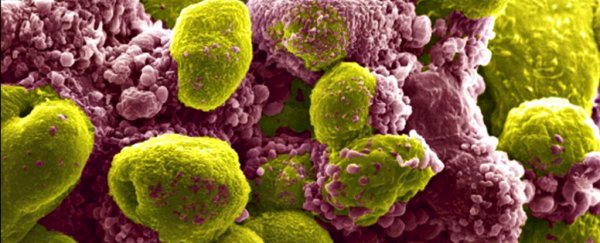A man with advanced prostate cancer has seen the disease disappear, after doctors blasted his tumour with huge amounts of testosterone. The treatment also slowed the progress of the disease in the majority of the 46 other patients in a small, ongoing clinical trial.
The early results are unexpected, because prostate cancer is thought to use testosterone as fuel, and most current treatments work by starving tumours of the hormone.
"The results are unexpected and exciting," said lead researcher Sam Denmeade from the Johns Hopkins University School of Medicine in Baltimore.
"Our goal is to shock the cancer cells by exposing them rapidly to very high followed by very low levels of testosterone in the blood."
The team tested the experimental treatment on 47 men with advanced prostate cancer, who were all resistant to treatment using two of the latest hormone therapy drugs: enzalutamide and abiraterone.
Most prostate cancer therapies over the past few decades have taken the approach of starving the prostate of testosterone. But tumours can quickly become resistant to these treatments, and lab results in the past had shown that high levels of the hormone could suppress or even kill prostate cancer cells.
So the Johns Hopkins team decided to try something different - they gave the patients at least three cycles of what's called bipolar androgen therapy (BAT), which involved alternatively flooding and starving the body of testosterone.
This involved three high dose injections of testosterone every 28 days, while simultaneously giving the men a drug that stopped their testicles from naturally producing testosterone.
That means once the initial injection ran out, the men would have no more testosterone in their systems.
Success was measured by monitoring the size of the men's tumours, as well as levels of the Prostate Specific Antigen (PSA) that serves as a marker for prostate cancer.
The BAT results were impressive - PSA levels fell in around 40 percent of the 47 participants, and roughly 30 percent of the men had their levels cut by more than half.
One man has had 22 cycles of the treatment (almost two years) and his tumour has disappeared altogether.
"Many of the men have stable disease that has not progressed for more than 12 months," said Denmeade.
"I think we may have cured one man whose PSA dropped to zero after three months and has remained so now for 22 cycles. His disease has all disappeared."
The results haven't been peer-reviewed as yet, so for now we need to take them with a grain of salt. But they were presented to the medical community this week at the Molecular Targets and Cancer Therapeutics symposium in Munich, Germany, to be scrutinised further.
The trial is still ongoing, with the researchers continuing to recruit and treat more patients, so until that process is complete, we won't have a proper understanding of how promising the new therapy really is.
And with 20 to 30 percent of men with prostate cancer relapsing after the five-year mark, we definitely can't get too excited just yet.
But in addition to showing promise as a treatment in its own right, the therapy also showed signs that it might make cancer more susceptible to traditional drugs.
Six of the men in the trial had initially tested positive for a protein associated with resistance to the drug enzalutamide - but after treatment, this protein had disappeared.
The problem now is that the researchers still aren't entirely sure how the treatment works. It seems to involve cell signalling and part of the process of cell division - the large doses of testosterone appear to encourage prostate cancer cells to make breaks in their DNA.
But a lot more research needs to be done before this treatment can be recommended more broadly.
"We are still in the early stages of figuring out how this works and how to incorporate it into the treatment paradigm for prostate cancer," said Denmeade.
In terms of side effects, one patient reported an increase in pain, and another had a problem with urine retention, but generally, the drug was well tolerated - although the sample size so far is too small to say for sure.
To get more information, a multi-centre randomised trial is scheduled to begin soon in the US, comparing BAT with traditional prostate cancer drug enzalutamide. They're hoping to recruit 180 participants.
"If we find testosterone is superior then we would hope to move on to larger trials," said Denmeade.
"Our problem is this is not a drug that is owned by a pharmaceutical company; it is generic testosterone. So moving forward is going to be difficult due to issues with finding funds to run a bigger trial."
While the results so far are promising, it's too early to get excited just yet, Matt Hobbs from Prostate Cancer UK told Sarah Knapton from The Telegraph.
"This research is intriguing because it offers a hint that - somewhat unexpectedly - for some men whose cancers have reached that 'hormone-resistant' stage it may be possible to kill or stop growth of the cancer cells by actually overloading them with testosterone," he said.
"However, this is early stage research and further studies are needed in order to understand exactly how intriguing developments like this work and to test the findings more robustly in large clinical trials."
Hopefully, further researcher will provide some insight into how this impressive new treatment works, and show us how we can use it to save more lives from prostate cancer.
You can read the abstract of the results here.
